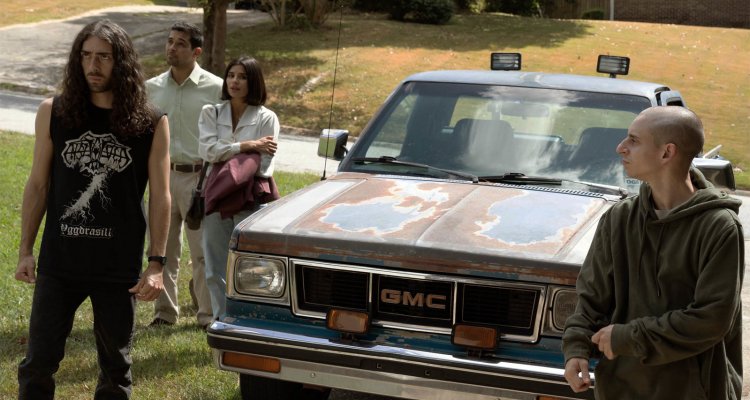In 2020, arguably, no concept is more ripe for scrutiny and interrogation than the quickly eroding and antiquated, notion, or illusion, of the American dream. These days, films focused on the plight of immigrants tend to go straight to horror—the soul-crushing dehumanizing story of being stripped of identity and being treated like garbage—and with good reason given the global climate and refugee crisis that’s rocked the planet (Fellow Sundance film “His House” goes right there, and fortunately succeeds). Colombian filmmaker Esteban Arango, however, goes for something more subtle mining the ideas of cultural displacement with “Blast Beat,” a drama that sharply inspects the concept of the American Dream and those who either pursue it or reject it altogether.
READ MORE: The 25 Most Anticipated Movies Of The 2020 Sundance Film Festival
Set in the pre-social media age of Colombia in 1999, political unrest abounds. Fleeing extortion in Bogota, the Restrepo brothers, Carlos Andrés (Mateo Arias) and Mateo Adrián (Moises Arias, “Monos,“), together with their mother Nelly (Diane Guerrero, “Orange Is the New Black“), settle in Atlanta, Georgia to reconnect with their father (Wilmer Valderrama), who previously escaped their homeland following violent attempt on his life. Of course, America’s land of opportunity isn’t as easily attainable as it may seem, and the Restrepo brothers quickly grow wary of their new home and the culture they’re now immersed in.
READ MORE: 100 Most Anticipated Films Of 2020
Though there are a few tender moments between the siblings, these polar opposite brothers are generally always at each other’s throat. Whereas the older, something of a mathematical science genius with big aeronautic dreams, Carlos subverts the tired image of the introverted nerd by presenting himself as a longhaired metalhead, Moises is resentful and more artistically-minded, happiest when committing petty crimes and generally causing trouble. Casting actual brothers to play the leads, Arango allows the organic sibling friction between the two American-born actors of Colombian descent to carry the emotional tension and weight of the film. It is hard not to sympathize with Mateo’s resentment at being the younger sibling who feels left behind and ignored. At the same time, his brother gets to be the star, especially since Mateo continually tries to remind his family that they never asked him if he wanted to move to the United States.
READ MORE: The 25 Best Movies Of 2020 We’ve Already Seen
Considering ideas of identity and maturity (or lack thereof), “Blast Beat” thoughtfully examines all cost of emigration and dislocation, emotional or otherwise. Considering the family was seemingly comfortable in Colombia, yet are struggling at every moment in the U.S., the film demonstrates the three-dimensional complex stress of relocation and the frustration that arises in holding faith in a dream that may be a delusion. Though the film asks you to sympathize with Mateo, it also asks you to care about Carlos and the pressure he feels to reach his goal of entering a prestigious Aerospace institute, which he can only do in Atlanta.
While a little cliched or overdone in moments, “Blast Beat” really succeeds when using music, especially when showcasing the differences between the two young men. Carlos is constantly blasting heavy metal music to drown his pain, while Mateo is an aspiring Spanish-language rapper. Arango uses music then to drive home what Mateo and Carlos are feeling at each moment, and even making “perreo” dancing a vital part of the storyline.
READ MORE: 52 Films Directed By Women To Watch In 2020
The rhythmic tempo that often mars “Blast Beat,” however, is repeating tired tropes of coming-of-age (bullies and such) and moving-away stories. As seen in countless films of this type before it, the warring siblings resent each other due to conflicting goals and dreams, while both find love interests at their new home despite neither character contributing much to the plot.
READ MORE: The 25 Best Movies Of 2020 We’ve Already Seen
Indeed, “Blast Beat” works best when it functions as a commentary on the American Dream. Beyond leaving home and the inherent sadness related with that voyage, the film tracks the difficulties of assimilating in a new place with a strange culture that isn’t necessarily welcoming of outsiders. In Atlanta, they continuously face racism and xenophobia, forcing them to question everything they envisioned about the U.S. as promised land. Both “Blast Beat” and corresponding Sundance film, “Minari,” confront the idea of the American Dream and its clearly a belief in the air thanks to the notion of income inequality becoming a major cultural talking point, and the current bigoted American administration treating entrance to the U.S. more like a country club privilege.
The problems the brothers face at school don’t stop at home. The time the family spent separated from their father takes a toll on all of them, especially Nelly, who was forced to raised them alone, and the resentment begins to bubble over. That being considered, Arango’s film isn’t anti-American either. Instead, the filmmaker is interested in illustrating the emotional complexities of immigration and the unexpected struggles that surface beyond the apparent financial hardship or cultural estrangement.
While “Blast Beat” often relies on a conventional structure, coming of age clichés, and sometimes fails to find depth in scenes in favor of music and mood, when it focuses on the turbulent relationship between the two brothers, it keeps the story grounded in emotion. An atypical take on the coming-to-America story, a sibling rivalry narrative and an examination of America as false utopia, a lot is going on in “Blast Beast,” and what it’s trying to say and achieve, but ultimately, it’s not hard to fall for these characters, turning every fight into something devastating, and every small moment of care, a triumph. [B]
Follow along for all of our coverage from the 2020 Sundance Film Festival here.

